REVIVE : Talks to Reconnect
A series of webinars to reflect on possibilities for a new world
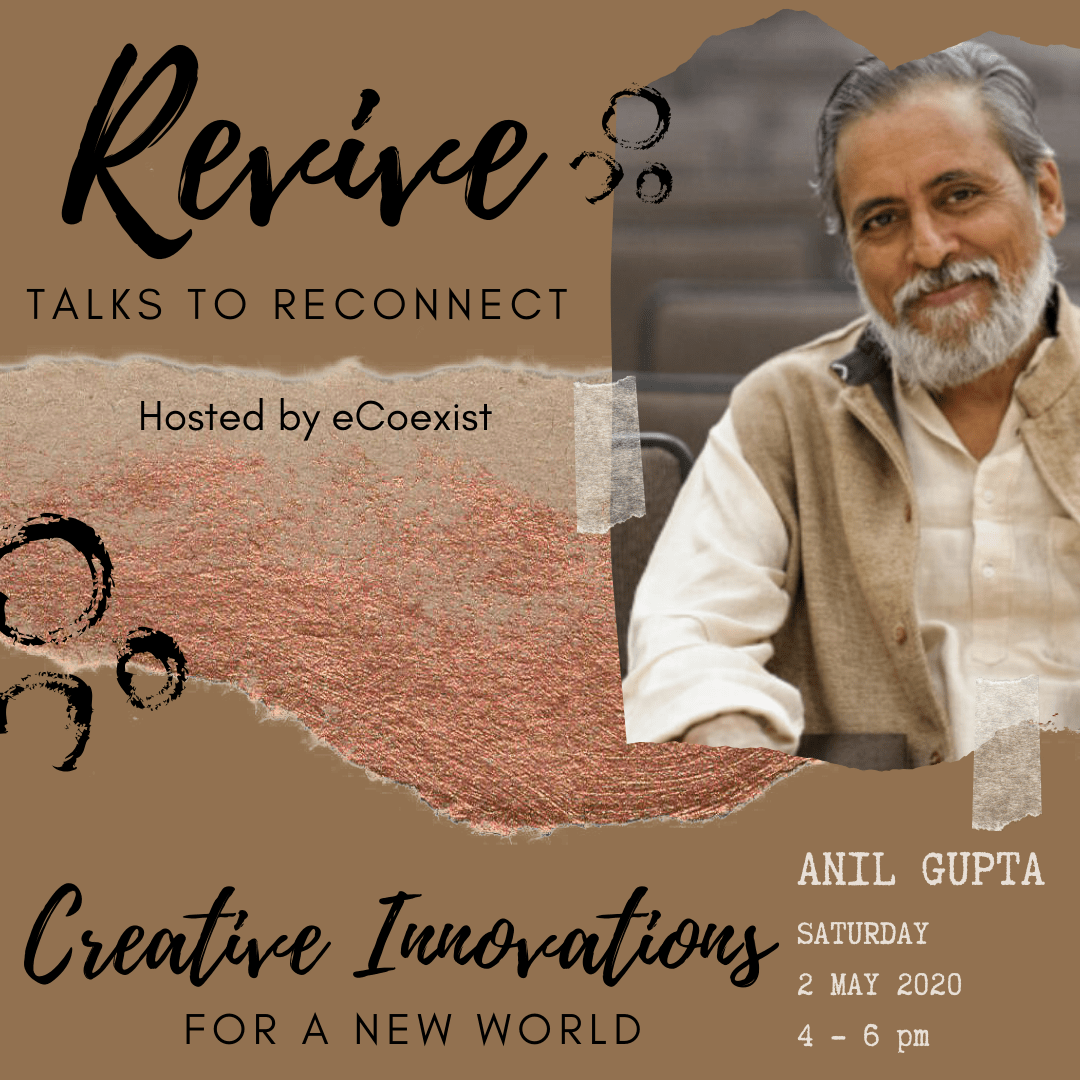
CREATIVE INNOVATIONS for a new world
Prof Anil Gupta, founder of the Honey Bee network speaks about the creativity and innovative solutions available among grassroots communities, and how these can be fundamental to transforming the lives and landscapes of rural India , post Cover. He speaks about the reverse migration of labourers and how the skills that they have learnt during their time in urban areas can now be used to bring small scale and appropriate technology to their native lands.
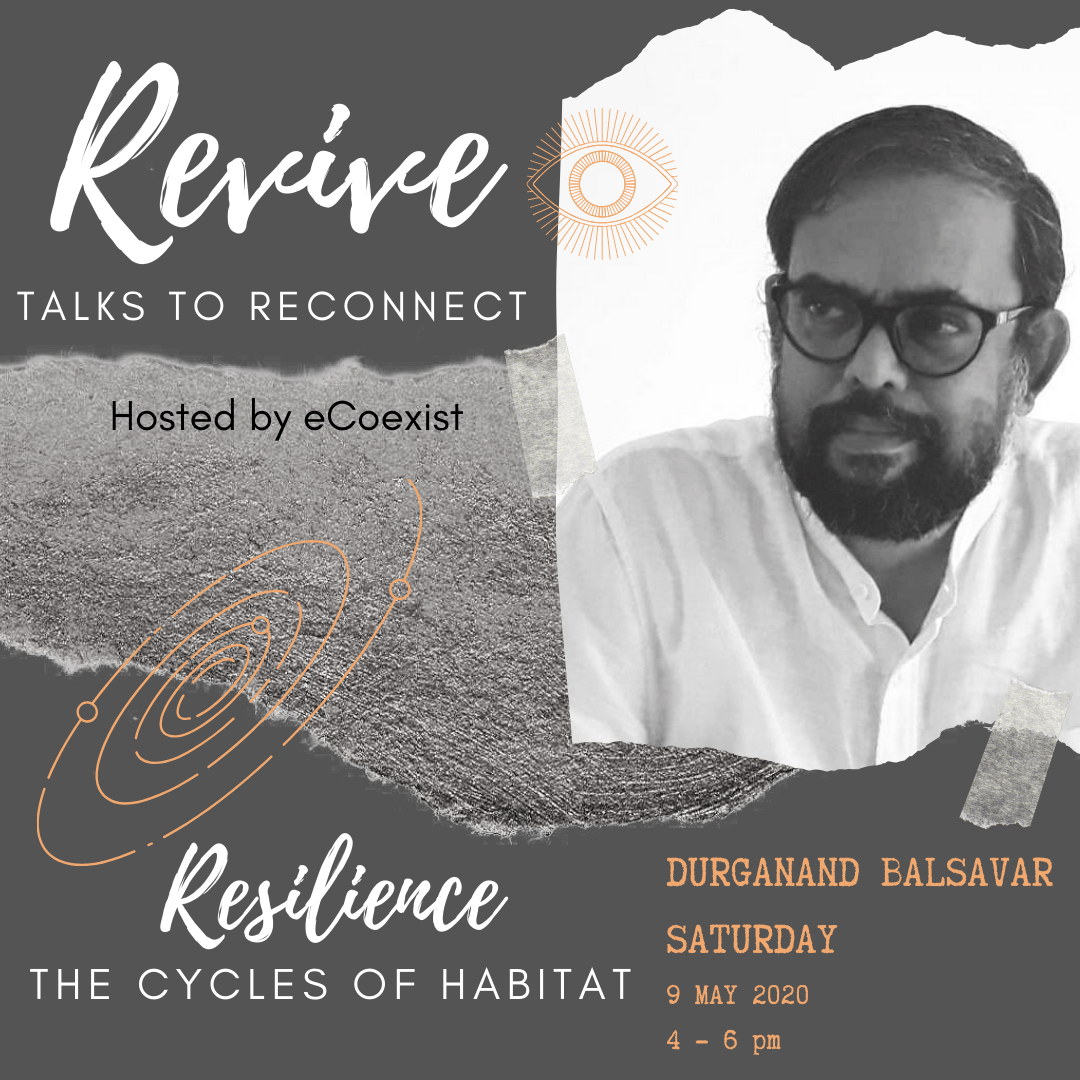
RESILIENCE: The Cycles of Habitat
Architect Durganand Balsavar, speaks about his experiences in disaster mitigation and rebuilding of communities.
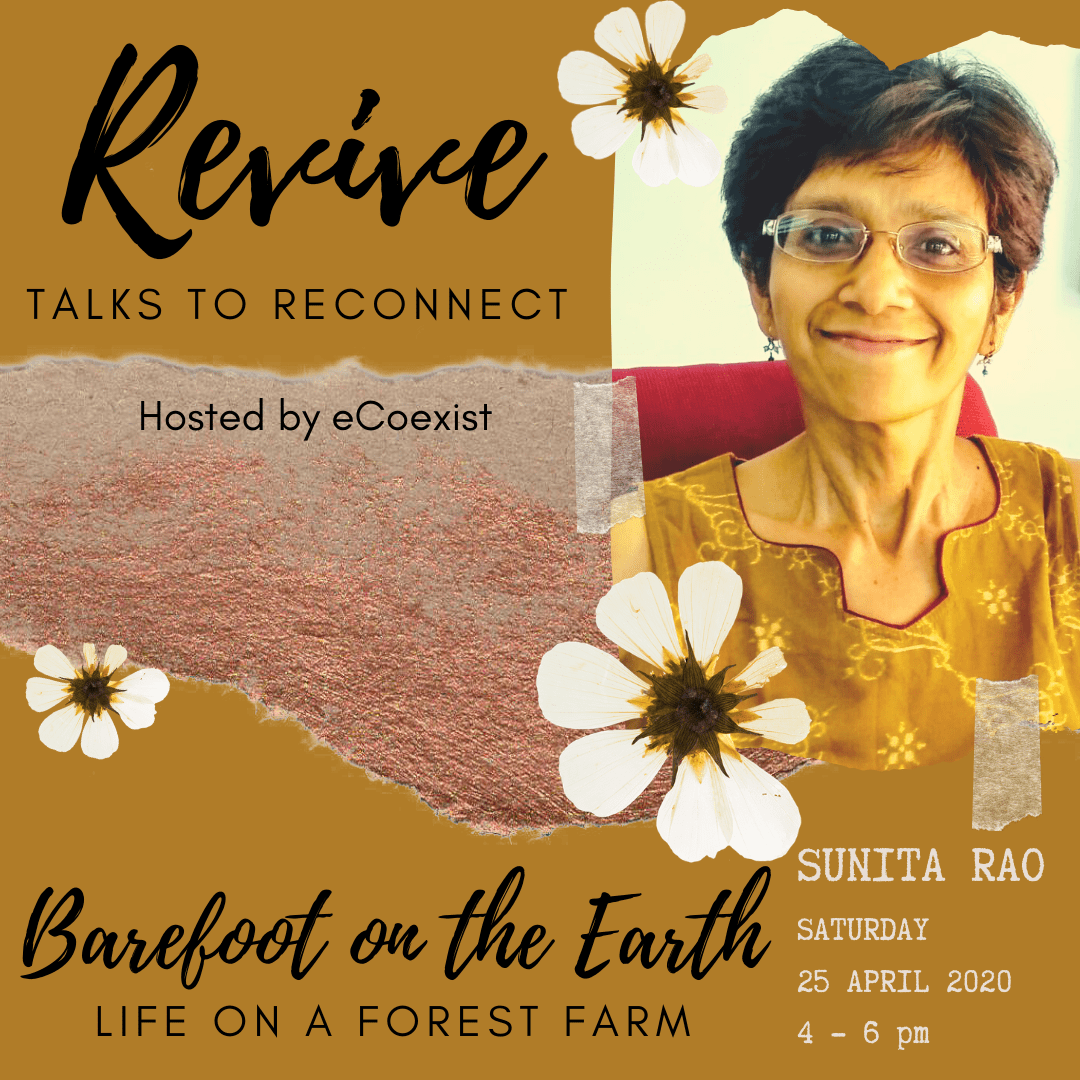
BAREFOOT ON THE EARTH: Life on a forest farm
Sunita Rao, founder of Vanastree, speaks about her journey in creating Huthina Betta, an organic forest farm in the forests of Sirsi, Karnataka. Sharing her challenges in single handedly managing a forest farm for two decades, Sunita speaks about the practical aspects of what it would mean for urban folks to return to life on the land.
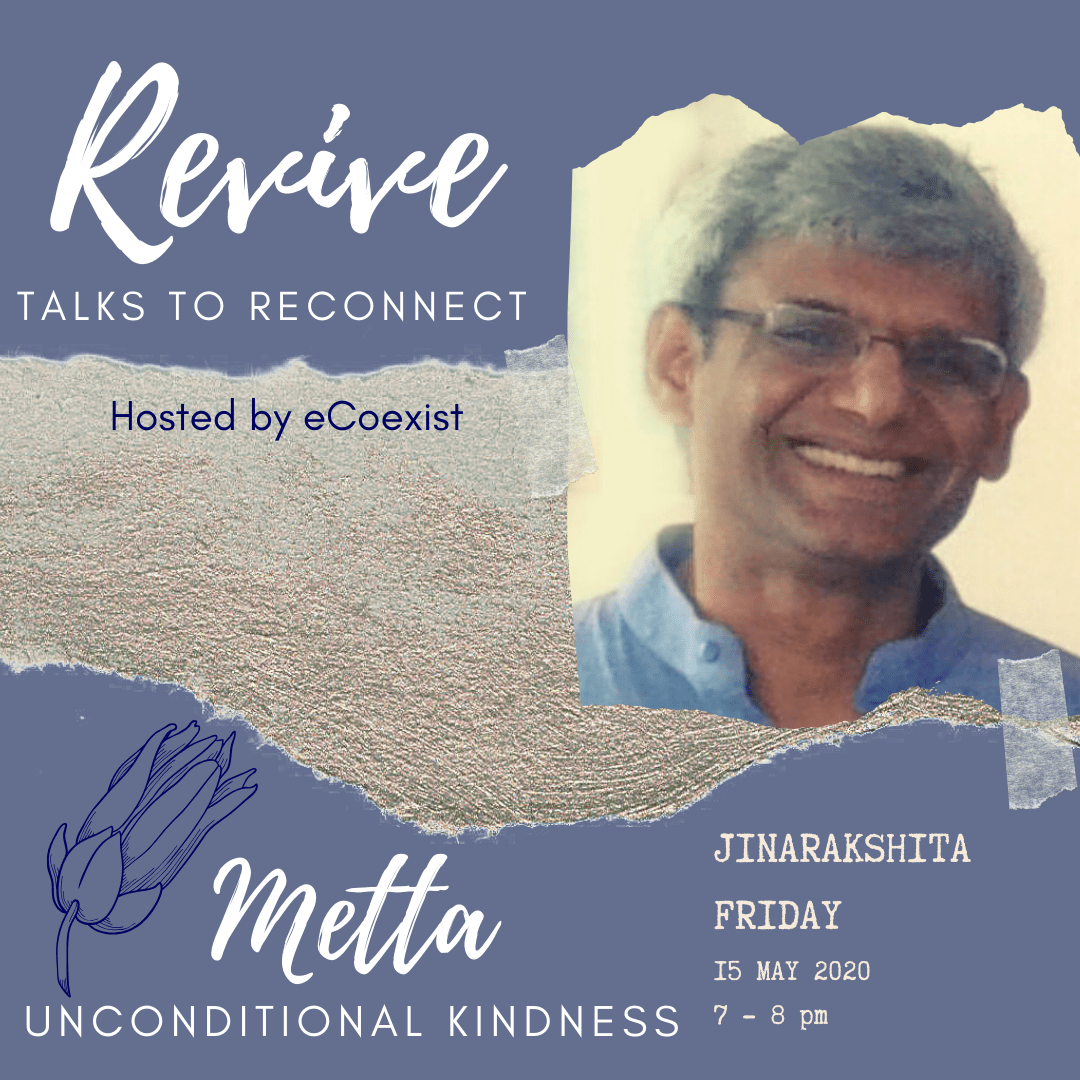
METTA : Unconditional kindness
The cultivation of a positive emotion is an important aspect of the Buddhist path. In this session he will discuss the relevance of the cultivation of "metta" in the context of the corona pandemic. Metta, often translated as "loving-kindness" is an open, unconditional friendliness.
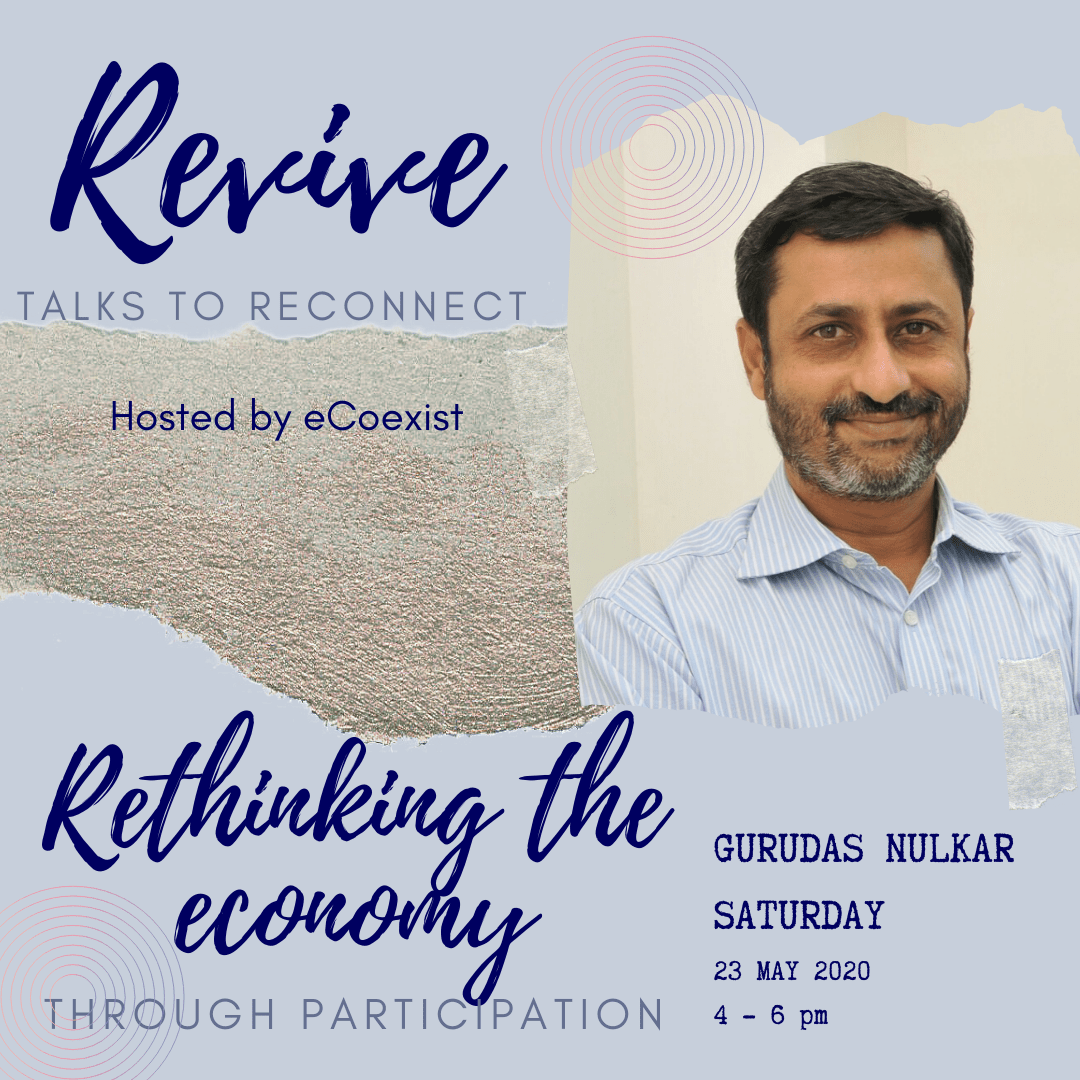
RETHINKING THE ECONOMY: Through Participation
Prof Gurudas Nulkar, is a professor of Management at Symbiosis University, Pune and trustee of the Ecological Society, Pune. In search of an alternate economy, in this episode, Gurudas discusses his optimistic views on what could be a Post Covid way of life. He feels that an alternate economy needs participative democracy as an enabler.
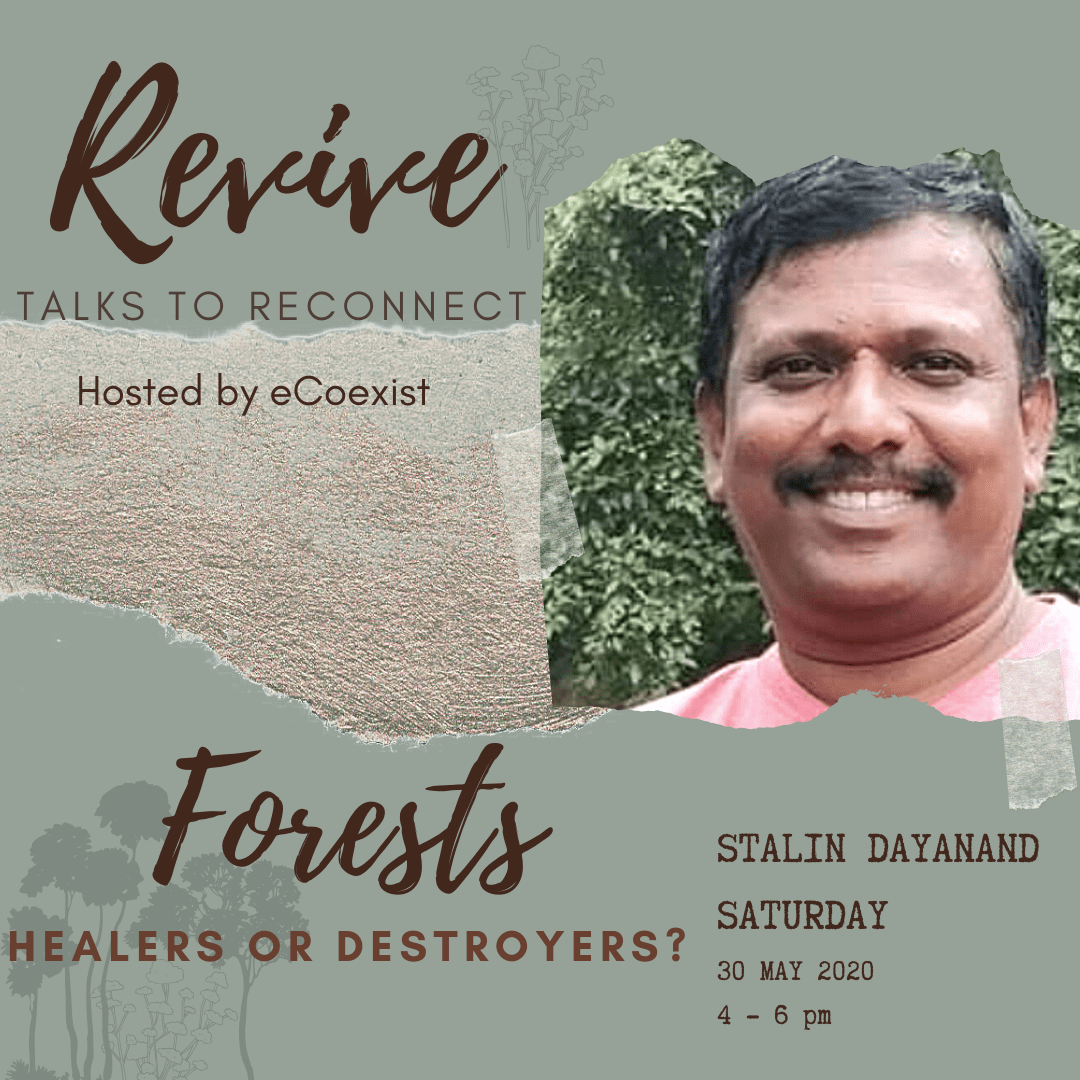
FORESTS: Healers or Destroyers?
What does a forest have to do with a pandemic? Do we need development at the cost of our forests? What exactly do the forests mean to the planet? Are we doing enough to keep mankind safe? Stalin Dayanand, an environmentalist with several years in conservation will be speaking about the importance of forest conservation to public health.
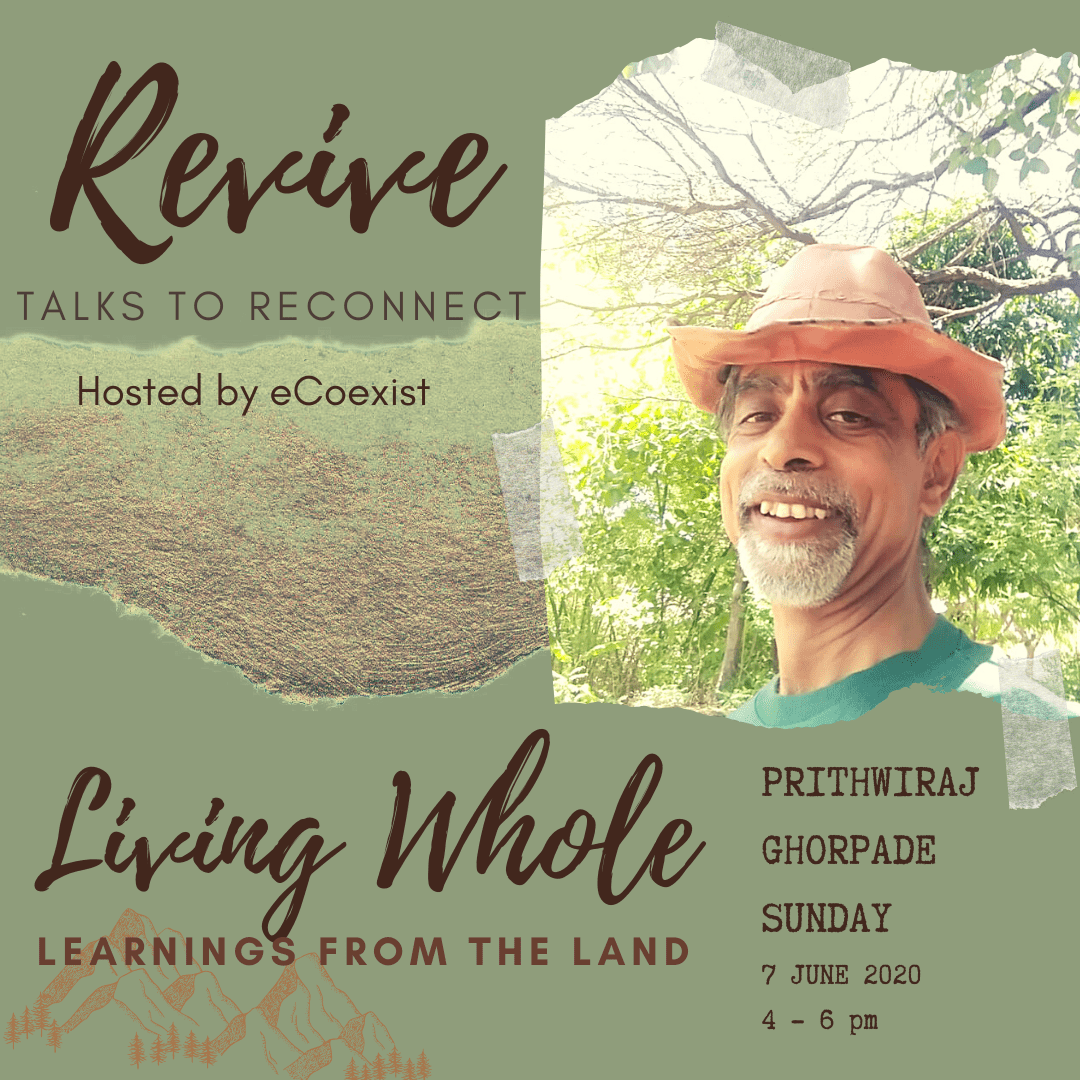
LIVING WHOLE: Learnings from the land
Prof Prithwiraj Ghorpade started his career as an entrepreneur with his own packaging industry, which led him to become a business consultant. However his love of the land, pulled him to set up an organic farm twenty five years ago. How did this shift transform his life and what were the learnings he received from the land? In conversation with Manisha Gutman, Prithwi shares the wisdom he has gained over this time, the challenges he faced and the gifts he received from making this shift.
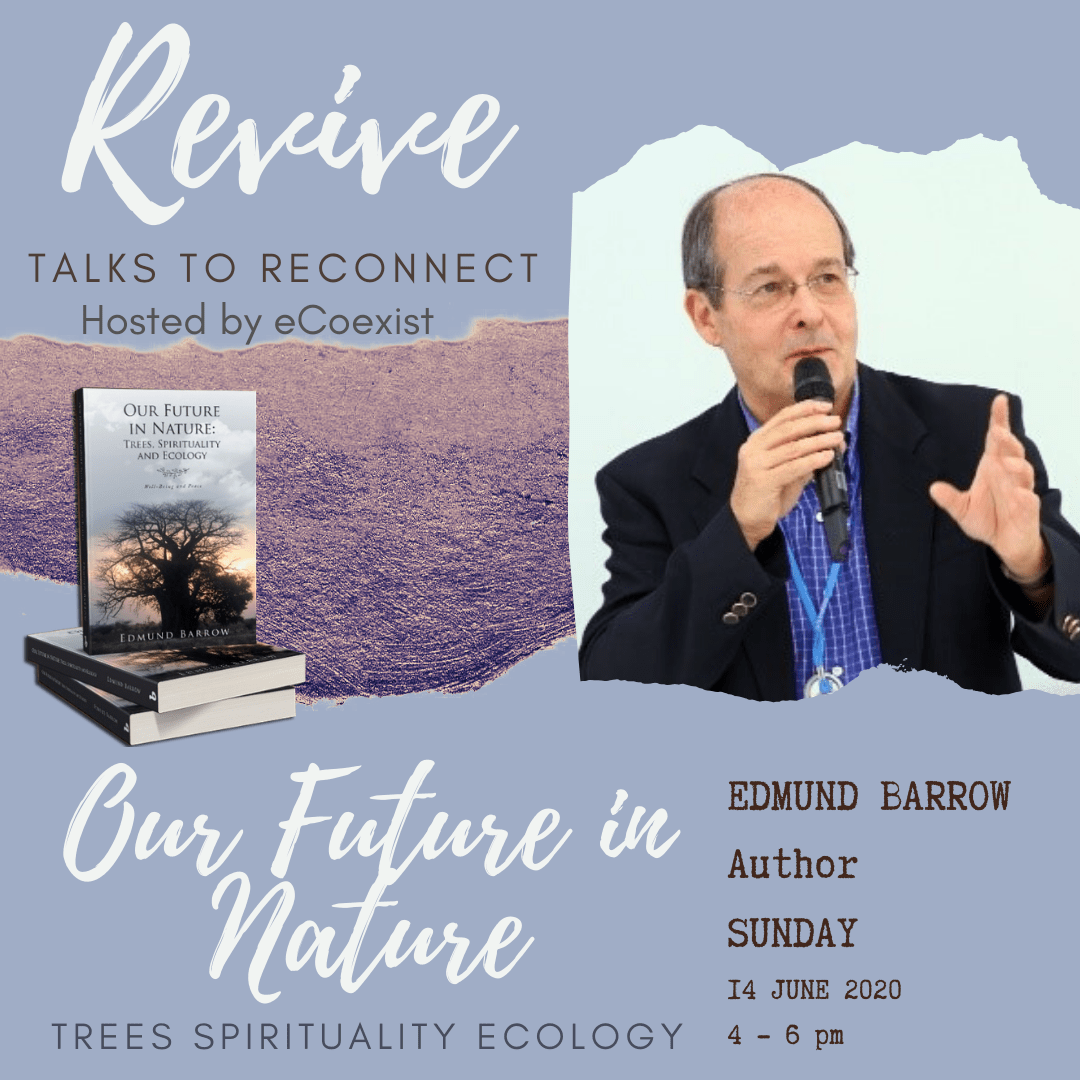
OUR FUTURE IN NATURE: Trees, Spirituality and Ecology
Edmund Barrow is a Kenya based conservationist and author, whose book - Our Future in nature - highlights how important sacred trees and sacred groves are for us now; how this can be a positive force for good in conservation, our lifestyles and livelihoods; and how this helps us connect with nature. It helps us see how we can use sacred trees and groves to foster peace in our time together with greater awareness about our fragile planet.
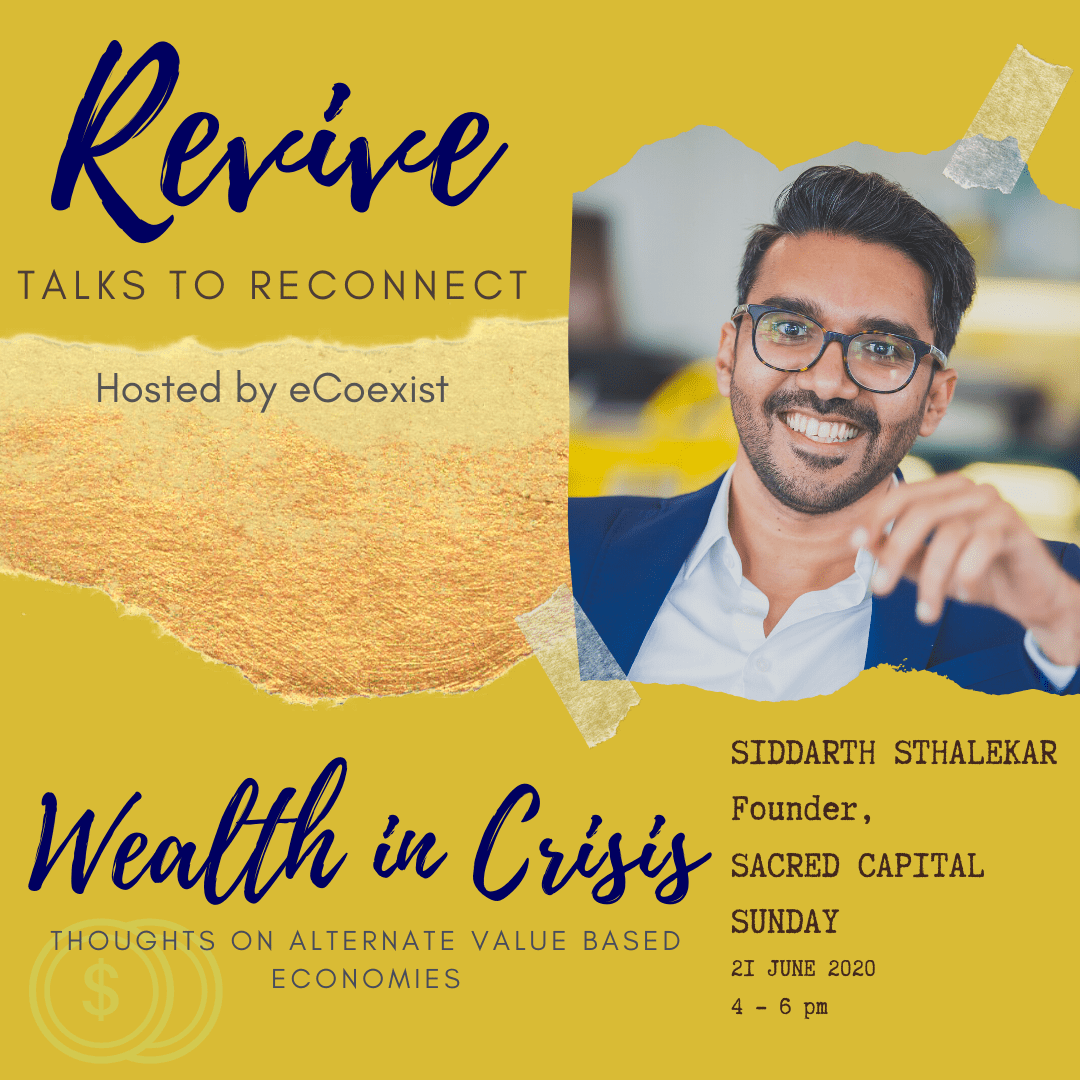
WEALTH IN CRISIS: Thoughts on alternate economies
COVID 19 has triggered a major shift in our economies ,and also in our personal finances and in our relationship with money. It has created uncertainty and anxiety and has forced us to question our sense of financial security. But will anything change post Covid? Will our realisations as individuals lead us to change as a society in the use and exploitation of our resources? Will we share more than we were doing before? Is there another way of organising economic activity so that it respects ecology and builds community?
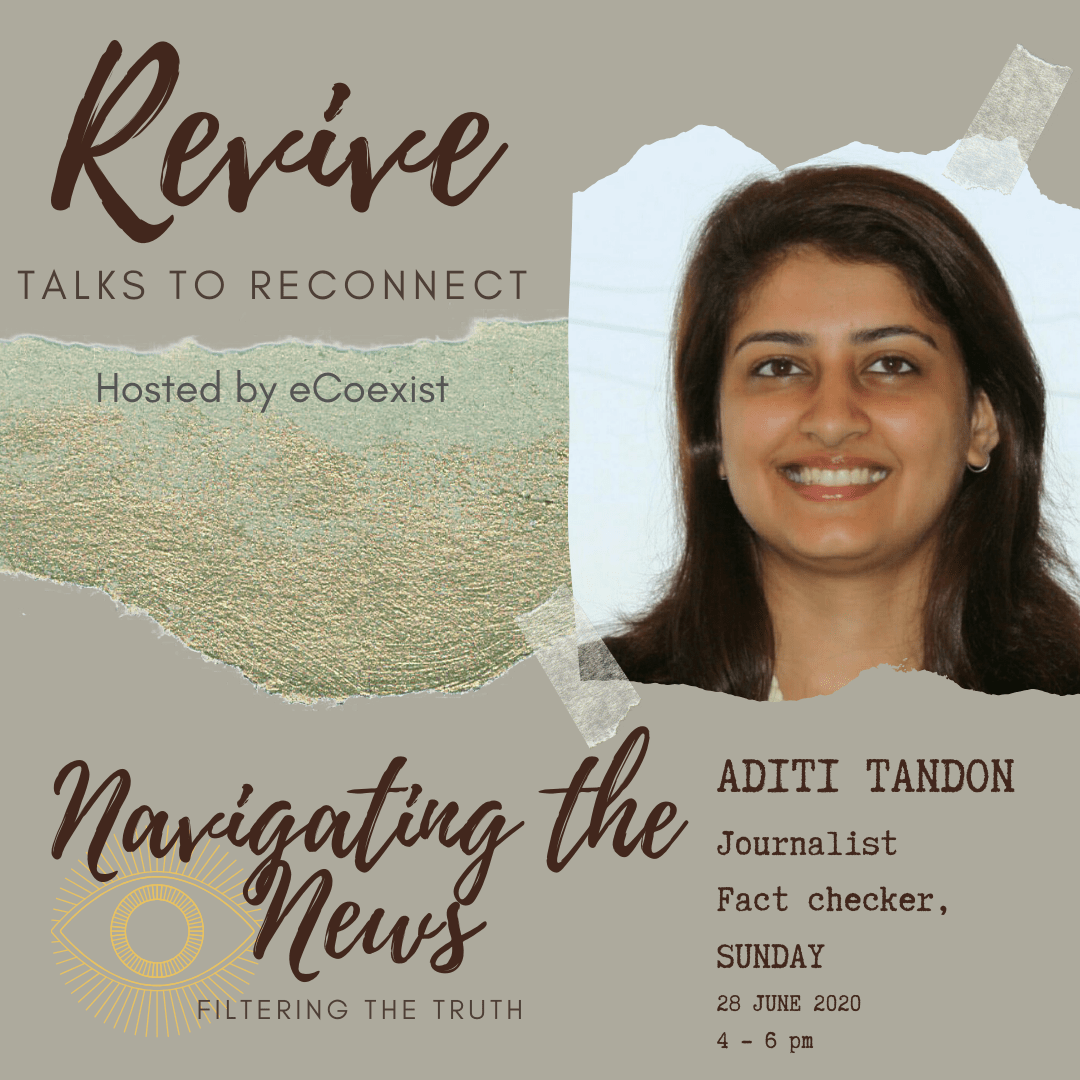
NAVIGATING THE NEWS: Filtering the truth
We consume the news and we don't realise that it consumes us. How do you take control of the information you consume to be able to lead a safe healthy and conscious life ? How do you navigate the flood of information coming you way..how do you know what to believe and what to discard ?
MISGUIDED COMPASSION : Rescuing Life
How can humans and animals coexist in the same habitat? How should our cities be planned to accomodate for other living beings? What should our attitude towards the animals who share our space be?
We hear about animal cruelty inflicted by individuals who despise animals, but over 15 years of working with animals has shown me that even individuals who like animals ever so often end up hurting them as much, and most often it is a case of misguided compassion. Sometimes, love can hurt.
We will be talking about:
- Human-Animal Conflict in Urban Ecosystems
- Irresponsible Pet Ownership
- Animal Hoarding
- Random acts of kindness that cost animals their lives!
Regeneration, Restoration and Revival
The Timbaktu Collective (www.timbaktu.org) has stamped its presence in a clear operational area of 182 villages in the drought-prone and ecologically challenged Anantapuram district,Andhra Pradesh, amongst 25,000 marginalised families. It has so far established 13 community-owned and managed Cooperatives in order to demonstrate a model of local production, consumption and distribution. These alternatives have the potential to facilitate a vibrant local economy based on ecological sustainability, fair trade, and social and economic inclusion.
WATER & WASTE WATER: People Skills and Solutions
Vishwanath Srikantaiah, is a water activist and has been working in the space for over 34 years. Mr. Vishwanath was a columnist for The Hindu for 12 yrs, and wrote weekly columns about water preservation. A Civil Engineer, and Urban & Regional Planner by profession, he currently teaches at the Azim Premji University as Adjunct Faculty
Vishwanath has been working with a community of traditional well diggers to revive this skill and build recharge wells to direct water back into underground aquifers. The well diggers aim to dig a million wells for Bengaluru. The Mannu Vaddars will earn their livelihood using traditional skills , and the city will get water security.
REVIVE SUPPORT: Funds raised for the NGO Grama Vikas, Mulbagal: Rs 20,000 /- www.gramavikas.org
ECOLOGICAL RESTORATION : Relevance to Pandemics
Manasi Karandikar and Ketaki Ghate set up their firm Oikos nearly 20 years ago, with a focus on ecological restoration. Having studied with Prof Prakash Gole at the Ecological Society, they set out to educate Indians about the need to restore ecosystems and habitats. Pioneers in their field, the duo have won many accolades for their path breaking work. In this episode of REVIVE they speak about the relevance of ecosystems conservation and restoration to public health. Drawing links between the current pandemic and the degradation of ecosystems they will walk us through what it would take to rebuild our natural world to protect our own health.
LOVE IS MY RELIGION
Where does love figure in a new paradigm? Sr Lucy, who started her journey as a Christian nun, has founded Maher ashram, a shelter for the homeless, that takes all the people shunned an rejected by mainstream society. What will it take to create a new society, that does not need to have seperate institutions such as Maher? How is our vision for a loving and inclusive society connected to Nature conservation?
Forgotten Greens : Wild Edibles
For the session on Forgotten Greens, Shruti will be sharing about the uncultivated plants that grow in our immediate ecosystem and why the need for reviving the fast disappearing knowledge system is important. Often undermined, the uncultivated greens are ways to localize our food and medicinal system. She will also share some tips on urban foraging and how to add these wild edibles to our daily diet.
Elephants and Us : The Assam Haathi Project
Some weeks ago, the tragic death of a pregnant elephant in Kerala broke our hearts and captured our attention. But this is not an isolated nor rare event. The Asian elephant populations in India, have been steadily declining while elephants in Africa grow in numbers. We need to do something about this NOW! As part of our celebrations of Ganesh Chaturthi, the eCoexist team is running a crowd funding campaign to raise funds for elephant conservation. These monies will be sent to Assam, to a project led by Nandita Hazarika called The Assam Haathi Project. This session is about the work that goes into ensuring that both elephant and humans stay safe.
Faith in Conservation : Dr Charles McNeill
The Interfaith Rainforest Initiative is an international, multi-faith alliance that aims to bring moral urgency and faith-based leadership to global efforts to end tropical deforestation. It is a platform for religious leaders to work hand-in-hand with indigenous peoples, governments, civil society and business on actions that protect rainforests and safeguard those that serve as their guardians.
Dr Charles McNeill , one of the founders of this initiative will be speaking to us on REVIVE on Sunday Sept 6, at 9 30 am. For 25 years, McNeill has been a leader in the United Nations' work on sound environmental management for sustainable development in the developing world. Previous to his current position with UN Environment, he managed UNDP's programs on forests, biodiversity & ecosystems, climate change mitigation & adaptation, sustainable energy, stakeholder engagement, the MDGs, SDGs and public-private partnerships.
Throughout his career, he has devoted special attention to engaging with and empowering Indigenous Peoples (IPs) & local communities.
He founded/led many global initiatives, including the:
• ‘The 'Interfaith Rainforest Initiative' (www.interfaithrainforest.org)
• ‘Indigenous Peoples Initiative for UNFCCC COP 21’ to ensure IPs made an unprecedented contribution to the Paris Agreement in Dec 2015
• Global coalition of gov’ts, businesses, NGOs & IPs that delivered the Forests Action Area of the UN 2014 Climate Summit, and COPs 21, 22, 23 & created the ‘New York Declaration on Forests’
• ‘Community-Based REDD+’ initiative to provide grants to empower IPs & communities to protect forests
• ‘UN-REDD Programme’ which supports nationally-led REDD+ efforts in 60 forest countries
• ‘Equator Initiative’, a global capacity building, knowledge and advocacy effort to foster successful local solutions for people, nature and resilient communities, featuring the ‘Equator Prize’
McNeill has raised over $500 million for the programs he created. In the 1990s, he developed GEF programs throughout Africa on biodiversity & climate change, and subsequently managed GEF programming and policy globally. Prior to joining UNDP, he worked in the NGO sector on hunger eradication and sustainable development in South Asia and Africa
Conserving Sacred Mountains : Dr Edwin Bernbaum
The sense of the sacred inspired by natural features, mountains in particular, has a crucial role to play in programs to preserve cultural and biological diversity. In a presentation illustrated with striking images, Edwin Bernbaum describes two projects that have taken this approach: one, to restore a sacred forest at Badrinath, the major pilgrimage shrine in the Indian Himalaya; the other to nominate Mount Kailas in Tibet and the pilgrimage routes leading to it from India and Nepal as an UNESCO trans-boundary World Heritage Site.
Edwin Bernbaum, Ph.D., is Co-Chair of the IUCN specialist group on Cultural and Spiritual Values of Protected Areas (CSVPA) and Senior Fellow at The Mountain Institute. A scholar of comparative religion and mythology, his work focuses on the relationship between culture and the environment. His book Sacred Mountains of the World won the Commonwealth Club of California's gold medal for best work of nonfiction and was the basis for an exhibit of his photographs at the Smithsonian Institution.
Environmental Regulation in and Economic Crisis : Kanchi Kohli
The talk will focus on the history, experience and challenges of environment regulation in India, locating it within the questions that confront both citizens and governments during an economic crisis.
Kanchi Kohli works on environment, forest and biodiversity governance in India. Her work explores the links between law, industrialization and environment justice. Her research interests also include the implementation of biodiversity regulations in India.
She has authored various publications, research papers and popular articles. She co-edited the book Business Interests and the Environmental Crisis (SAGE-India). Since 2004, she co-coordinates an Information Dissemination Service on forest and wildlife cases in the Supreme Court of India. She co-edited The Case for the Commons, a six part e-publication on the administrative follow up of the 2011 Supreme Court of India judgment on the protection of the commons.
COVID 19 : Crisis or Opportunity: Protest, Protect and Build
Crises often catapult us into action. But what is this activism based in ? Is it coming from fear, panic and anger?
In this REVIVE talk, Satish ji will speak to us about what action we can take as a response to the COVID crisis ... but more importantly, what motivation should inspire our actions. Perhaps this is what Gandhiji would have encouraged us to do , to find that space of love within ourselves and serve from this inner space of peace.
As we struggle to translate our realisations from COVID into a new direction for our lives and work, how can we craft a life of elegant simplicity ? Not just for ourselves, but for all our fellow beings.

